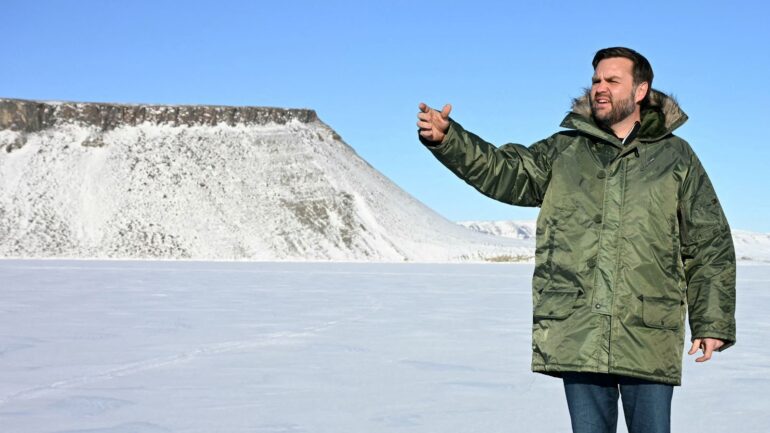Imagine a massive, icy island sitting quietly in the far north, surrounded by freezing waters. It might not sound like much, but Greenland has suddenly become a big deal in the world of U.S. national security. Vice President J.D. Vance recently visited this remote place and came back with a bold message: the United States will protect its interests in Greenland “come hell or high water.” Why does this chilly territory matter so much to America, and what’s really at stake? Let’s break it down.
A Key Player in Missile Defense
Greenland isn’t just a frozen wilderness—it’s a critical piece in America’s defense puzzle. Located between North America and Europe, it’s perfectly positioned to help the U.S. keep an eye on potential threats, especially missiles. Think of it like a lookout tower in a video game: if you control it, you can spot danger coming from miles away. Vice President Vance told Newsmax that Greenland is vital for missile defense, which is all about stopping enemy missiles before they can hit American cities. With countries like Russia and China building up their military power, having Greenland as a strategic base could be a game-changer for keeping the U.S. safe.
Military Force: A Controversial Option
Here’s where things get intense. Former President Donald Trump once said he wouldn’t rule out using military force to secure Greenland if it came down to it. That idea sparked a lot of debate, but Vance backed it up, calling it “common sense.” On “Rob Schmitt Tonight,” he explained, “This matters to our security… and we’re going to protect America’s interests come hell or high water.” For Vance, it’s not about starting a fight—it’s about being ready to do whatever it takes to keep the country safe. While sending troops to Greenland might sound extreme to some, he sees it as a last-resort option in a world where threats are growing.
Greenland’s Push for Independence
There’s another twist to this story: Greenland wants to break free from Denmark, the country that’s controlled it for years. During his trip, Vance noticed that Greenlanders are eager for independence. But there’s a catch—Denmark sends them a lot of money, about $60,000 per person each year, to help keep things running. Without that cash, independence could be tough. That’s where the U.S. comes in. Vance hinted that America could step up with even more financial support, making independence easier and building a stronger bond with Greenland. It’s a win-win in his eyes: Greenland gets its freedom, and the U.S. gets a closer ally in a key location.
What’s Next for Greenland and the U.S.?
So, why does all this matter? Greenland’s future could shake up its ties with Denmark and open the door to a bigger role for the United States. If it goes independent and teams up with America, it might become a crucial outpost in the fight to keep the U.S. secure. But it also raises big questions: How far is the U.S. willing to go to make that happen? Will it stick to diplomacy, or could military action really come into play? For now, Vice President Vance is sending a loud and clear signal: Greenland is too important to ignore. As global powers compete for control, this icy island could end up shaping the future of international security. What do you think—should the U.S. fight for Greenland, or find another way to stay safe?
